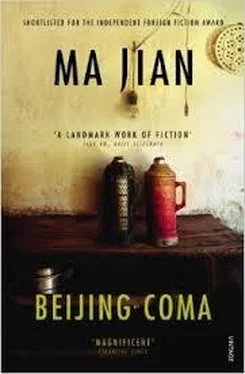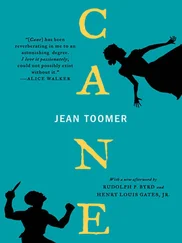A few fragments of speech were still trapped in my temporal lobes: ‘You must be tired. Do you want me to come over?… A Hong Kong fortune teller said that we were husband and wife in a previous life… If we’re going to break up, we might as well get it over and done with…’
I continued to go to classes, eat, get drunk and sleep. But inside, I was dead, and everything around me was dead. I locked my doors, including the one that opened onto the balcony. I didn’t want any of the love that still remained in the room to slip away.
A few days later, Mou Sen and Wang Fei rescued me from the room and carried me to hospital. I was put in a ward that had four — no three — cupboards, three beds, and three stools. The words GUANGZHOU UNIVERSITY HOSPITAL were painted on the bedsteads. The form clipped to the end of my bed read: ‘Registration number: 0046, Department of Internal Medicine, South Block. Diagnosis: physical weakness and inflamed liver.’
Cortisol seeps into your cells, filling them with sadness and causing your memories of her to ferment.
Mou Sen told me that being dumped by a girl is like missing a train: there’s always another one to jump onto. Sun Chunlin told me that I’d become too caught up in my emotions, and that I should strive to regain a sense of balance. Wu Bin said that I should smuggle myself across the border and go and look for A-Mei in Hong Kong. Wang Fei just told me to buck up and get over it.
In hospital, the days passed very slowly. The cement floors were washed with disinfectant every morning, and the strong smell would stay in the air all day. My bed’s wooden legs were swollen with water, like the organs inside my body. A rag that had fallen from the mop lay coiled snakelike beside one of the legs. I stared at it for hours.
‘Number 46! How come you haven’t taken your morning pills?’ the nurse cried.
‘I feel nauseous,’ I sighed.
When I was admitted to hospital, I had a temperature of forty degrees. I’d been drinking and smoking too much, and not getting enough sleep. My body was exhausted. I knew I was going under, and I wanted to sink right to the bottom. I was in no state to smuggle myself into Hong Kong.
I moved my gaze to the nurse’s stomach. She was wearing a long red skirt. With her warm hands, she bound a length of cloth around my arm. ‘Stick out your tongue. It’s time for your medicine.’ The nurse’s breath stroked my face.
I glanced to the side and saw the ring left by a cup on my bedside table. The splashes of antiseptic lotion next to it matched the urine stains on my sheets. A fly that had lost a wing was crawling around the oily crumbs trapped in a crack in the wood.
The draught blowing in from the corridor smelt of soiled sanitary towels. I closed my eyes and remembered my mother telling me how she gave birth to me in a hospital corridor.
The corridor outside looked like the interior of a long cement pipe. Most of the light from the blue bulbs hanging from the ceiling was sucked away by the dark-green walls. There was a white spittoon on the maroon floor. The lacquer along the central strip of the floor had been worn away, exposing the grey cement underneath.
I lay in the damp bed, waiting for my body to recover. Five days went by. I tried not to think about A-Mei, but her voice kept coming back to me, repeating softly, ‘If we’re going to break up, we might as well get it over and done with.’
It was only when I developed hepatitis that her voice began to fade away, and my breathing was able to return to its normal rhythm.
There was a thin nurse who would flit by like a shadow. She stirred the air when she walked into the room. As the brightness of her dress changed in the moving light, I’d be reminded of the female scents I’d breathed in the past. I didn’t have the strength to ask her not to walk so close to me.
In the end, it was my father’s journal that saved me. When I remembered the misery and death he described, my suffering seemed trivial. During my last three days in hospital, I thought only of the angelic Liu Ping, and the monstrous men who’d carved her up and eaten her. And I murmured to myself, ‘Dai Wei, you must stop wallowing in your emotions and do something with your life. Do something that will make this country a better place…’
Axons within the olfactory organ in the walls of your nasal cavity have sprouted new nerve endings, reconnecting to the surrounding nerve fibres. As you inhale the breeze, an electric signal darts up the new neural pathways to your brain.
My mother is talking to someone. ‘Today is 4 February 1990,’ she says. ‘He’s been in a coma for exactly eight months, officer. Even if he did wake up now, he’d be a cretin. He wouldn’t be able to tell you anything.’
I must be back in the flat now. I presume my mother has put me on the iron bed. I have no recollection of being removed from the hospital. I wonder who carried me up the six flights of stairs.
‘He’s just pretending to be dead, the brat,’ the officer says, tapping my face. ‘He’s afraid that we’ll fling him in jail when he wakes up.’
The change of location seems to have had a beneficial effect on me. The noises around me sound clearer and my sense of smell has improved. I can smell the scent of tree-bark in the breeze blowing in through the window and the stale odours in the flat. These odours are the familiar smells of home: my father’s ashes; the insoles, socks and gloves drying out on the radiator; all the things that have fallen behind the radiator, such as scraps of steamed bread, plastic caps of ballpoint pens, the bits of paper that once wrapped meat pies, fried chicken or pickled cabbage; my mother’s clothes and skin, and the disinfectant she sprinkles over the floor.
‘The bastards!’ my mother says as soon as the police officer leaves the room. ‘They turn their guns on innocent people, then brand whoever gets shot a criminal. What kind of morality is that?’
Images of the flat and its immediate surroundings fill my mind, pushing out thoughts of A-Mei, the Guangzhou hospital, and my vague recollection of the Beijing hospital I have just left.
I strain to catch distant noises. It sounds as though it’s snowing. I imagine the cold, hard scene outside the window: the white ice on the ground streaked with yellow debris emitted from the tall chimney of the electricity generator. In the morning, before the ash has fallen from the roofs and the branches of the big locust tree in our compound, the ice is still slippery. Food hawkers from the suburbs fire up their woks in the street outside and sell fried flatbreads. Large green flies dart through the fragrant smoke rising from the charcoal embers. In the afternoon, the flies move to the crates of yogurt stacked on the street corner. Every day, the same two elderly men sit beside the crates, trying to catch some rays of sun. One of them neither talks nor smokes, but just stares blankly at the people passing by. Occasionally a van turns off the main road and drives down the street to collect rubbish or deliver soft drinks to the grocery shop, blocking the way of cyclists, who wait behind it in the freezing cold, ringing their bells impatiently…
If your brain produces a little more protein, the fluid that has been blocked will flow again, and you’ll be able to return to the world.
‘The police dragged him out of hospital last month. They’d found out he was involved in the student demonstrations, and didn’t want news of his condition leaking out. He’s been put under constant surveillance. Two officers visit me every day to remind me to take him to the public security office as soon as he wakes up. Not even Tian Yi dares visit him any more.’
My mother is talking to Yanyan, an old friend of mine from Southern University.
Читать дальше












